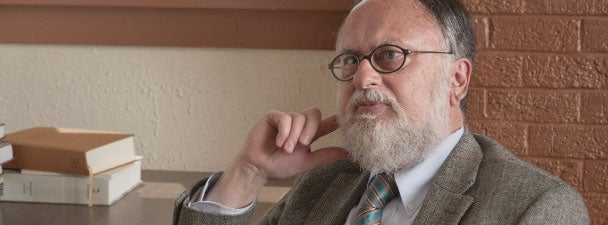 He’s always had strong opinions, a passion for writing and a penchant for doing things his own way.
He’s always had strong opinions, a passion for writing and a penchant for doing things his own way.
As editor of Chronicles: A Magazine of American Culture and president of the publication’s parent organization, The Rockford Institute, Thomas Fleming ’67 has spent most of his career sounding off on immigration, race, religion, politics and just about every other topic that is ill-advised at the dinner table.
And he doesn’t much care if you disagree with his conservative Christian views. After 30 years at the helm of the magazine, he’s used to criticism. In fact, it seems to motivate him.
Be warned, though: If you do challenge him, you’d better know your history and be on your toes. A Classicist who is fluent in ancient Greek and Latin, who has lectured around the world and who has authored several books, Fleming has an intelligence that’s just as sharp as his independent streak.
Both of these traits revealed themselves early in Fleming’s life. When, for example, he found the curriculum at Mt. Pleasant’s Moultrie High School (now a middle school) dull, he simply dropped out. Yet Harvard still offered to accept him if he’d just finish high school.
Fleming would have none of it.
Besides, the College of Charleston – then a private school of about 500 students – was less rigid on the diploma requirement. And it offered Greek and Latin. So across the Cooper River Fleming went.
And there he thrived.
“Going to the College, it was like being reborn,” says Fleming. “It was like living in a village. Everybody knew everybody.”
The College was everything Harvard was not. Harvard, says Fleming, would likely have molded him into a carbon copy of “too many Harvard grads with literary and intellectual interests – an unoriginal compendium of fashionable platitudes.”
Fortunately, he escaped that fate. Instead, he completed his B.A. in Classics and, bypassing a graduate degree, took the fast track to a Ph.D. in Classics from the University of North Carolina-Chapel Hill. He taught and did research at UNC and, later, at Miami of Ohio. But he soon grew tired of academia’s rules.
Fleming longed to return to Charleston. And he got pretty close when, in 1976, he became headmaster of Archibald Rutledge Academy in McClellanville, S.C. He enjoyed the five years he spent at the private school, in no small part because the job afforded him plenty of time for writing and other interests related to his growing dissatisfaction with American culture.
During this time, he became a founding member of the League of the South as well as the founding editor of Southern Partisan, a conservative political magazine devoted to Southern culture and history, and further honed his writing skills by doing book reviews for Charleston’s The Evening Post and by contributing articles to various publications, including Chronicles, which, in 1984, asked him to join its staff as managing editor.
Within six months of Fleming’s move to Illinois for the job, the magazine’s editor died. Fleming was named his successor.
Fleming revamped the magazine, established an online version and began publishing younger writers. Over the years, the magazine has gained a reputation as a driving force behind the political philosophy known as paleoconservatism (think former presidential candidate Pat Buchanan and nationally syndicated columnist Robert Novak), and The Rockford Institute has become known as a conservative “think tank,” though – because the organization doesn’t lobby and only rarely issues position papers – Fleming prefers to call it a “study center.”
“Our organization is built on the principle that if there are fundamental questions to settle and problems to solve, it won’t be done by politics and legal changes,” explains Fleming. “When either the left or the right tries to ram their policies down the throats of unwilling people, it really doesn’t work. It has to be done through cultural change, through a change in peoples’ attitudes.”
It’s what Fleming has spent his career doing: Changing cultural opinions and attitudes through his writing – and, of course, always doing it his way.
– Ron Menchaca ’98
Photo by Adam Daniels




